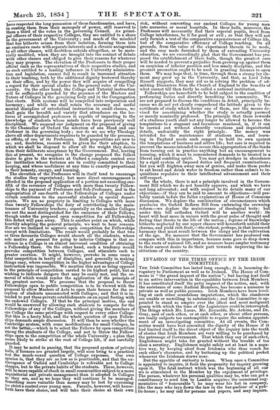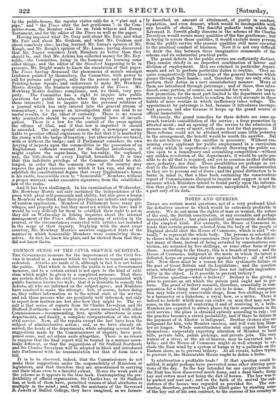INVASION OF THE TIMES OFFICE BY THE ERISH COMMITTEE.
THE Irish Committee has lasted long enough; it is becoming de- rogatory to Parliament as well as to Ireland. The House of Com- mons is "the grand inquest of the nation"; but having lent itself to an active intervention in the squabbles between Irish Members, it has constituted itself the petty inquest of the nation, and, with the assistance of some Radical Members, has become a nuisance to private as well as public persons. Irish Members have been level- ling at each other scandalous imputations, which the slanderers are unable or unwilling to substantiate ; and the Committee is ap- pointed to stand as umpire over the idlest and most malignant gossip with which the time of the Legislature could be interrupted. The things which Mr. Lucas, Mr. Reynolds, Mr. Arkins, and Dr. Gray, said of each other, or at each other, or about other persons, are really subjects too contemptible to require the solemn appoint- ment of an investigating committee. At all events, the Com- mittee would have best consulted the dignity of the House if it had limited itself to the direct object of the inquiry into the truth of stories that Irish Members are very willing to be purchased by the patronage of Government. That which they say of each other, Englishmen might take for granted without the trouble of too close a scrutiny. Englishmen might safely act at least in a nega- tive way, by keeping aloof from Irishmen who thus vouch for each other's character, and by buttoning up the political pocket whenever the Irishman draws near.
But the appetite of curiosity is keen. When once a Committee is appointed to inquire it feels the propensity for inquiry growing upon it. The fatal instinct which was the beginning of all our wo is stimulated in the Member by the enjoyment of privilege. The person, whatever his personal qualities may be, who can get a constituency to send him to London acquires the occasional aug- mentative of " honourable "; he may wear his hat in company, like the man who lays down the law in the bar-parlour of a pub- lie-house; he may call for persons and papers, and may inquire. In the public-house, the regular visitor calls for a "pint and a pipe," and "the Times after the last gentleman "; in the Com- mittee-room, the Member calls for an Irish witness and Douay Testament, and for the editor of the Times as well as the paper. Having inquired what Dr. Gray said about Mr. Fair' and what Mr. Fair said about Mr. Graham and what Mr. Graham said about somebody else ; having learned Mr. Lucas's opinion of Mr. Keogh, and Mr. Keogh's opinion of Mr. Lucas; having discovered that Mr. Napier considers Irish Members no better than they should be, and that Mr. Arkins has collected money for Mr. Rey- nolds,—the Committee, being in the humour for learning some other things, and the editor of the Standard happening to be in presence, Mr. Bright wants to know the circulation of that paper. The Times having discussed the phenomena of morals amongst Irishmen painted by themselves, the Committee, with power to call for persons and papers, calls for the person and paper from Printing-house Square, and endeavours to make Mr. Mowbray Morris divulge the business arrangements of the Times. Mr. Mowbray Morris declines compliance, and, we think, very pro- perly. The Committee has a right to inquire into public questions for public interests, when the inquiry can promote those interests; • but to inquire into the personal relations of a journal which has only entered into the general stream of commentary, is to pursue an investigation that can lead to no useful results for the idlest of curiosity. There is no reason why journalists should be exposed to special laws of investi- gation. There is a law for the control of the press against the offence of libel, and if that law is imperfect it should be amended. The only special reason why a newspaper seems liable to peculiar official cognizance is the fact that it is marked by the stamp with the badge of taxation : but other articles are taxed, with or without the badge ; and if Parliament considers its own levying of imposts upon the commodities in the possession of an Englishman sufficient warrant for the further interference, it might explore the sugar-basin, the tea-caddy, the cupboard, nay, the title-deeds of every English household. It is time that this indefinite privilege of the Commons should be chal- lenged, in order that the common sense of the country may reprove the paltry excesses into which it has run and may re- establish the constitutional dogma that every Englishman's house is his castle, inaccessible even to " honourable " Members, without a proper warrant, under executive signature, from the established law of the realm.
And it has been challenged. In his examination of Wednesday, Mr. Mowbray Morris not only sustained the independence of the press with great self-possession and ability, but also gave a lesson to Members who think that their privileges are infinite and capable of random application. Members of Parliament have many pri- vileges, and properly so, but they must act within the law; and it would be very difficult for them to establish their right to act as they did on Wednesday in fishing inquiries about the internal management of the Times office, the meaning of articles in the journal, or the circumstances connected with articles not included 112 the scope of their inquiry. Replying with the most exact courtesy. Mr. Mowbray Morris's answers suggested hints of the manner in which honourable Members were committing them- selves. In fact, he knew his place, and he showed them that they did not know theirs.



































 Previous page
Previous page